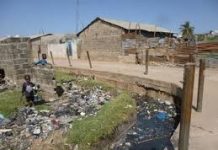Abdoulie G. Dibba
The Food and Agriculture Organisation of the United Nations in collaboration with its partner the Ministry of Agriculture, on Friday 3 June 2016, commissioned eight EU- MDG 1c Gardens in Joben Village Lower Fulladu West District Central River Region South of the Gambia.
According to the organisers, EU- MDG 1c was meant to assist small holder farmers and small scale food processors to overcome production constraints and to add value through improved production, processing and marketing techniques as well as further improve the nutritional situation within the country via the school feeding program.
They went on to indicate that the project was also to contribute to the overall goal of reducing agricultural poverty by increasing Household food Security on a sustainable basis consistent with the overall goal of Government polices and the Millennium Development Goal (MDG) 1c; which is “Eradicating extreme poverty and hunger to reduce by half the people who are living on less than $2.00 a day by 2015”.
In delivering her statement, FAO Country Rep. Perpetua Ketapa Kalala stated that the EU-MDG 1c project is a three year intervention designed to support smallholder farmers to overcome production constraints, and improve post-harvest handling and marketing of agricultural produce as well as contribute towards piloting of home grown school feeding programme through strengthening of farmer based organizations and expand their market opportunities.
She noted that the EU MDG 1c project has two main components and that Component 1which deals with production enhancement and expand market opportunities for small holder farmers, is been implemented by FAO and Component 2 which deals with School Feeding Programme is been implemented by WFP.
The FAO Country Rep stated that the eight (8) Vegetable gardens that they are commissioning are located in the following regions:
Northe Bank Region, Nuimi Lamin 8 ha garden and Conteh kunda Nigi 3.5 ha;
Central River Region, Madina Lamin Kanteh 5 ha and Njoben 5ha;
Upper River Region, Dasilamin 3.5ha and Dampha Kunda 5ha; and Lower River Region, Sutukung 5ha and Jappineh 5 ha.
She pointed out that each of the eight vegetable gardens are equipped with the following facilities:
- Perimeter chain linked fence reinforced with live fencing of lime and campeshe trees. 1,947 seedlings of live fencing (265 campeshe & 1,682 limes) transplanted to boost the perimeter fences, food security and income
- 8 bore holes powered by solar system and functional water reticulation network (20 concrete Reservoirs)
- Post-harvest infrastructure to improve post-harvest handling and quality management.
- Toilet facility block building
On his part, Attila LAJOS, Ambassador of the European Union to the
Gambia with EU funding, the MDG1c project has provided fencing, a new building, water boreholes and a fully functional solar pumping and water reticulation system.
He said, this provides all year round availability of solar pumped water for vegetable production as well as protection from encroaching animals.
From a practical point of view he said, this part of the MDG 1c project which provides support to Community Gardens has also supported women’s groups with training and inputs, such as seeds and that he went on to said, the availability of solar pumped water not only reduces women’s drudgery; it also dramatically increases potential production and incomes of those using the gardens, thus providing for greater food security.
On his part, the Deputy Minister of Agriculture Sheriffo Bojang asserted that “Today’s event is in line with FAD’s mandate, to reduce poverty through the improvement of agricultural productivity and incomes, and promoting better nutritional practices at all levels and programmes that enhance direct and immediate access to food by the neediest”.
“The Ministry of Agriculture will do everything possible to ensure that the sustainability plans put in place are implemented to the fullest and the facilities provided are operational and maintained. We will urge the Department of Agriculture to ensure continuous provision of agricultural extension services to improve and strengthen farmer’s knowledge and skills in good agricultural practices and thereby improve agricultural productivity” Deputy Minister Bojang stated.





















